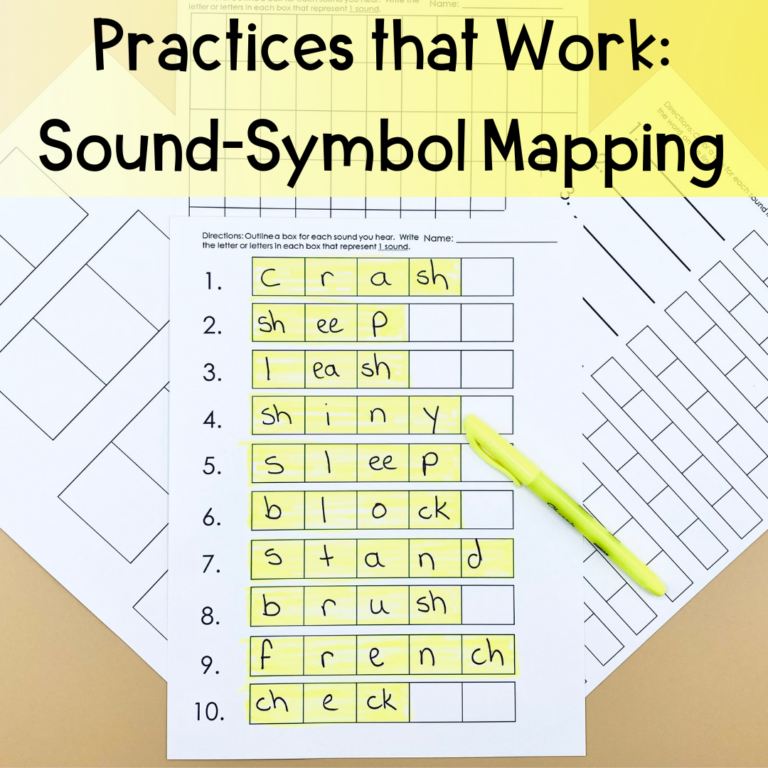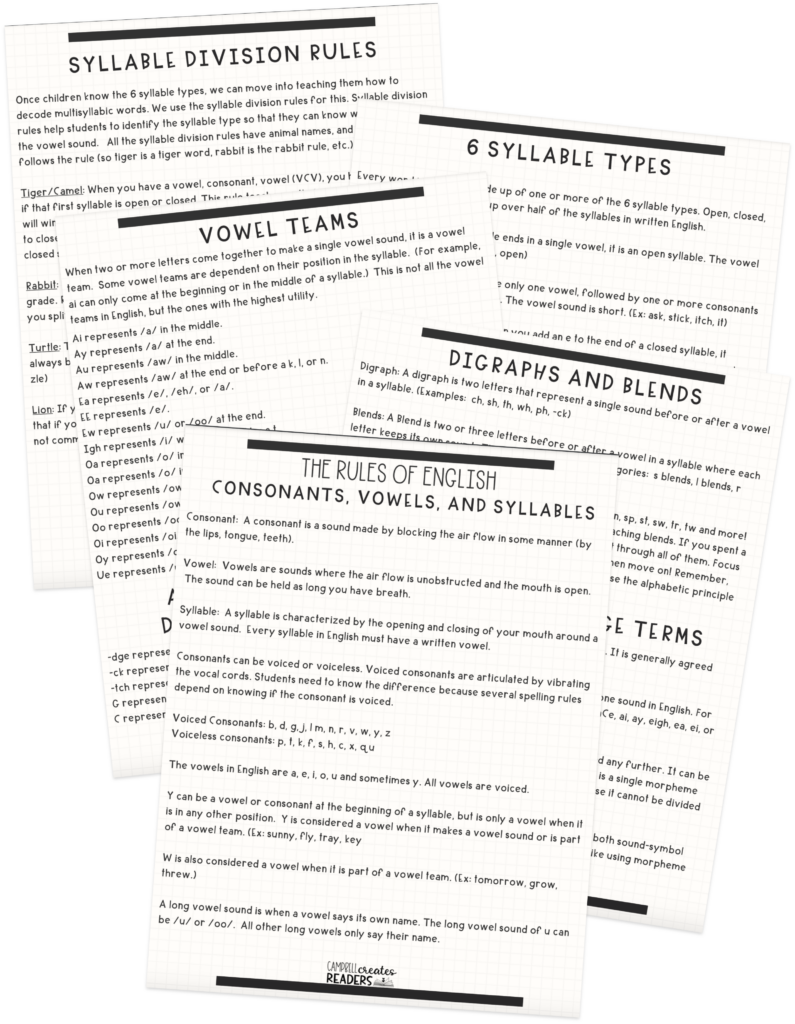
Share This:
You have perfectly planned your small group lessons. You know the skills, you’ve copied the materials, you’ve read the texts to help plan. You. Are. Ready. And then you remember that while you’re working with 5 kids, you have 18 other kids that will need meaningful work.
Sounds familiar, right? Today, I want to talk to you about what the other students are doing while you are in small group. Although as an interventionist I am only teaching small group without other children, over the past 10 years I have had experience as a 4th, 1st, and 3rd grade teacher.

I suggest every child in your class has a baggie, folder, or book box with decodable texts. In years past, these would be filled with leveled texts we read in small group. Now that I know better, decodable texts would be a constant center. I am urging you to allow all children to have reading time, not just the early finishers. We know that in order to be successful readers, our children need lots and lots of time reading texts.
When children leave my table, the first assignment they have is to reread the text we just read. Then, they might answer a question about the text that they bring back to demonstrate they did the work. If the decodable text is one suitable for comprehension work, it might be a comprehension question. Another option is to have them list the words that follow a target pattern. Whatever the task, I want them to do something that would extend the work that we just did. After they reread the text, they can reread other decodables they have read. This would also be an appropriate time for some free choice reading (however that looks for your class).
I am a big, BIG, proponent of children playing games in small groups, for so many reasons. Aside from the fact that they are a great opportunity to practice phonics skills, they provide a much-needed break to children. School is exhausting, and these tiny humans need a chance to relax.

There are so many fun phonics and phonemic awareness games out there, and I’ll list some of my favorite in the resources. I encourage you to think outside the typical phonics games, though. Games that we enjoy playing as adults can also serve a fantastic purpose. I love the Headbandz game because students have to use their oral language to describe something. If they don’t provide a good description, they can’t win. Scattergories is great because children have to come up with different words around a target letter. I also really like the game, “Don’t Say it.” Students have to get their classmates to say a certain word, without saying other words. For example, they might have to get their classmates to guess “hot dog,” without saying “ketchup, mustard, or bun.” In the resources section, I have an Amazon list where you can find a lot of fun game suggestions.
Another reason children benefit from playing games is that many simply don’t know how to handle taking turns, playing fair, and being a gracious loser. When I was in the classroom, one of their morning work options was to play any fun game. That way, as they were playing, I could help model the appropriate citizenship skills for them to use during the time I’m not with them.

Especially because of COVID, we have seen a huge rise in the number of 1-1 devices in schools. There are a lot of quality apps and websites that students can access. One thing I will suggest to all teachers, especially those in the primary grades: if a child has a tablet, encourage them to use a stylus. When they are writing, even on a screen, we need to promote proper pencil grip.
For kindergartners, I recommend Letter School. It is not free, but there’s simply nothing else like it. For each letter, there are 3 levels. On the first level, the app will demonstrate the proper formation. The second level has a guide for students. The third level, however, has students doing creating the letter on their own, without a guide or a model. This app was recommended to me by our occupational therapist, and it is one that I’ve used for years now.
My students always used Raz-Kids. Raz-Kids is centered around leveled texts, however. Do I think we need to abandon it? Nope, we need to rethink it. Instead of assigning children levels to work through, just open up that reading room. Instead of forcing children to simply read the book and answer quiz questions, encourage them to use the listening tool. Let’s stop making Raz-Kids a chore. Instead, allow kids to listen to the song books, the nursery rhyme books, and the “too easy” or “too hard” books. Another way you can use Raz-Kids is by assigning students the decodable texts!
Epic is another free online resource teachers can use. What I love about Epic is that it includes so many authentic books. With Raz-Kids, it is very obvious that these texts have been controlled in some way—either by the traditional leveling system or for targeted phonics skills. Epic includes 40,000 authentic books for children to choose from.

Word work can also be a great center, but a word of caution. If a child cannot read a word, spelling it 5 times or writing it in a rainbow will not be helpful. Students have to be able to at least read the word, as well as have some kind of an answer key nearby to help.
One activity you could have students do in a word work center is to look at pictures that match the target skill, and then write the word based off the picture. If I were doing ch vs. tch, I might put out pictures of lunch, witch, bunch, etc. The answers could be on the back for students. This would be a perfect place to use sound-symbol boxes.
Another option is student-led spelling tests. Choose one person from each group to be the teacher and have them give the rest of the group a spelling test. Make sure it is someone who is helpful and kind. The teacher should write the answer on a board, and all students need to make sure that their boards also have the correct answer before moving on to the next word.
Yup, I said it. YOUR CHILDREN CAN COMPLETE WORKSHEETS. But, did you notice that isn’t the only activity I posted? It also isn’t the first, and that’s for a reason. I can think few things worse than having to sit at a desk for an hour and do worksheets the entire time. Unfortunately, sometimes teachers even use worksheets as teaching tools, and not for practice.
That being said, worksheets are not inherently bad. It all depends on the task asked and how they are used. If I am practicing r-controlled vowels with my students, and I want a worksheet to see if they can decode and encode, then I am certainly going to use one. If I need a grade for something, why in the world wouldn’t I give them a worksheet to go in the gradebook? Worksheets are not demons, but they certainly should never be the only activity a child is asked to complete in independent time.
Each of these independent work centers are ones that you can establish, model, and maintain for the entire year. I have never been the teacher who made new centers every other week. I’m exhausted just thinking about it. Instead, I encourage you to look for authentic routines to build into your center time. This way, you can focus on those 5 children in your small group, while the other 18 take care of themselves.
Share This:

Savannah Campbell is a K-5 reading specialist. She has taught her entire 12-year teaching career at the school she went to as a child. She holds two master’s degrees in education from the College of William and Mary. Savannah is both Orton-Gillingham and LETRS trained. Her greatest hope in life is to allow all children to live the life they want by helping them to become literate individuals.

Savannah Campbell is a K-5 reading specialist. She has taught her entire 12-year teaching career at the school she went to as a child. She holds two master’s degrees in education from the College of William and Mary. Savannah is both Orton-Gillingham and LETRS trained. Her greatest hope in life is to allow all children to live the life they want by helping them to become literate individuals.
Feeling overwhelmed with all the terminology out there? Want to know the key terms all teachers need to teach phonics? In this FREE Rules of English cheat sheet, you get a 5 page pdf that takes you through the most important terms for understanding English—you’ll learn about digraphs, blends, syllable types, syllable divisions, and move. Grab today and take the stress out of your phonics prep!
